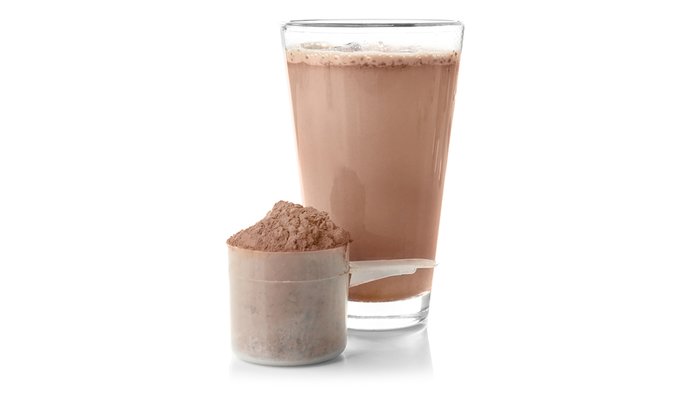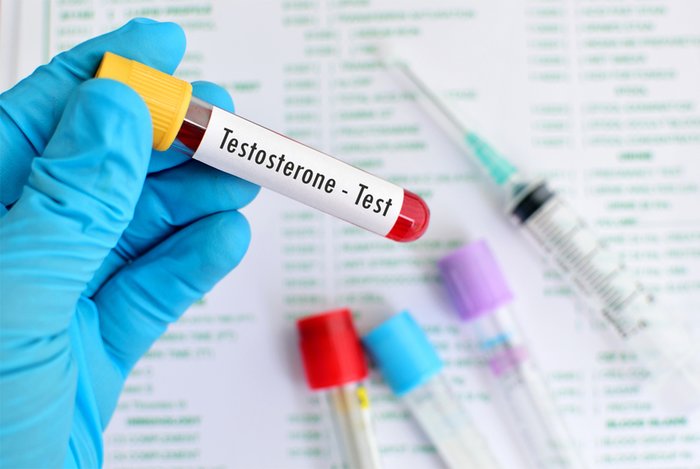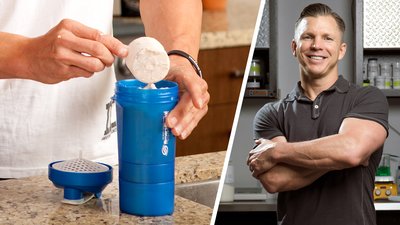Q: I've been told that eating protein lowers testosterone, but this seems somewhat counterintuitive. Should I really skip the shake in the name of my T-levels?
Protein decreasing your testosterone levels is an old fear that is grounded in good science. However, newer research offers a different picture, and points to a fascinating possibility. So, let's break down both viewpoints.
Circulating levels of testosterone temporarily increase whenever you train with high intensity and volume. It doesn't matter if you're male or female, just that you push yourself. And yes, that increase in testosterone from weight training alone has sometimes been shown to be reduced or blunted if you consume protein prior to or immediately after your workout.[1,2] But, not always.[3]
Further muddying the waters, other studies have also reported that high-protein diets lower resting levels of circulating testosterone, while others have shown that increasing protein can increase testosterone availability.[4,5]
So, which is it? Does protein increase or decrease your testosterone? A hypothesis raised within a 2008 paper raises the idea that it's not an either/or proposition.[6]
What if protein—or specific types of protein—cause both an increase in total testosterone, and a lowering of circulating levels of testosterone? Not because the protein is reducing your production of testosterone, but because more circulating testosterone is being removed from the bloodstream and actually entering cells where it can affect cell function?

In other words, what if certain proteins—or something in those proteins—can amplify the training-induced rise in the sensitivity of androgen receptors, those cellular ports that shuttle testosterone into cells and allow it to do its crucial work?
For one thing, it would mean that blood samples that only assess a snapshot of the amount of testosterone circulating outside of tissues (extracellular) would only be telling us a piece of the whole story. But, it would also mean that protein is seriously powerful stuff.
Pass the Test with Flying Colors
Unpublished research out of the Molecular and Applied Sciences Laboratory at Auburn University could turn everything we thought we knew about testosterone, as well as how testosterone itself is measured, on its head.[7]
Now to be clear, the new research I'm referring to was done in rodents, but it dovetails with research performed on humans and gives tantalizing possibilities for further human-focused research. The experiment required that the rats perform repeated muscle contractions to simulate four sets of a one-legged calf raise movement. Immediately after this "training", the rats received either 500 milligrams of whey protein, which provided approximately 50 milligrams of leucine, or the rats were given just an additional 54 milligrams of leucine, or water only (the control group). When extrapolated to humans, that's about 19 grams of whey protein and 2.8 grams of leucine—both pretty standard doses. Blood and muscle samples were assessed at three hours post-supplementation.
Here's what the researchers found: Supplementing with whey resulted in a 90.5-percent increase in the intracellular concentration of testosterone present within the exercised muscle, over the non-exercised muscle. Leucine alone, on the other hand, caused an average, but non-significant reduction in intracellular testosterone. In fact, whey raised intracellular levels of testosterone by 150 percent more than leucine alone within exercised muscle.

Such findings seem to support the trends observed by researchers in the 2008 paper, when they reported an increase in the production of androgen receptors within exercised muscles in response to whey, at one and 48 hours post-exercise.[6]
While further research needs to be done, it raises some fascinating possibilities. For example, if whey increases the uptake of testosterone from the blood and into exercised muscles, then the increased concentrations of testosterone present intracellularly could stimulate the production of more androgen receptors. Over time, having more androgen receptors would continue to pay off. It could make the muscle more sensitive to the presence of androgens and probably require less protein and allow you to make more of every bit of free testosterone you have.
If this is true, then the question of whether whey is truly anabolic or pro-testosterone would be an unequivocal yes!
The fact that whey produced this response, but leucine alone did not, is also significant. While free amino acids like leucine have their benefits, this study points to the potential to produce new discoveries about the specific value of whey protein. Specifically, there may be bioactive peptides present within whey protein that make whey a superior choice for post-workout nutrition and muscle-building.
More research needs to be done, but for now, definitely don't skip that shake out of fear that your test levels will take a hit. The opposite may actually be happening!
References
- Hulmi, J. J., Volek, J. S., SelÄnne, H., & Mero, A. A. (2005). Protein ingestion prior to strength exercise affects blood hormones and metabolism. Medicine & Science in Sports & Exercise, 37(11), 1990-1997.
- Hulmi, J. J., Ahtiainen, J. P., Selänne, H., Volek, J. S., Häkkinen, K., Kovanen, V., & Mero, A. A. (2008). Androgen receptors and testosterone in men—effects of protein ingestion, resistance exercise and fiber type. The Journal of Steroid Biochemistry and Molecular Biology, 110(1-2), 130-137.
- Kraemer, W. J., Solomon-Hill, G., Volk, B. M., Kupchak, B. R., Looney, D. P., Dunn-Lewis, C., ... & Maresh, C. M. (2013). The effects of soy and whey protein supplementation on acute hormonal responses to resistance exercise in men. Journal of the American College of Nutrition, 32(1), 66-74.
- Anderson, K. E., Rosner, W., Khan, M. S., New, M. I., Pang, S., Wissel, P. S., & Kappas, A. (1987). Diet-hormone interactions: protein/carbohydrate ratio alters reciprocally the plasma levels of testosterone and cortisol and their respective binding globulins in man. Life Sciences, 40(18), 1761-1768.
- Remer, T. (2001). Dietary protein and fiber intake and sex hormone-binding globulin. The Journal of Clinical Endocrinology and Metabolism, 86(2), 950.
- Hulmi, J. J., Ahtiainen, J. P., Selänne, H., Volek, J. S., Häkkinen, K., Kovanen, V., & Mero, A. A. (2008). Androgen receptors and testosterone in men—effects of protein ingestion, resistance exercise and fiber type. The Journal of Steroid Biochemistry and Molecular Biology, 110(1-2), 130-137.
- Unpublished data from PMID 26507545, presented by Lockwood CM, Roberts MD, Wilson J and Wilson G. Nutrition and muscle gains – Does leucine content matter: A Point-Counterpoint Debate. 12th Annual ISSN Conference and Expo, Austin, TX. June 12, 2015.

